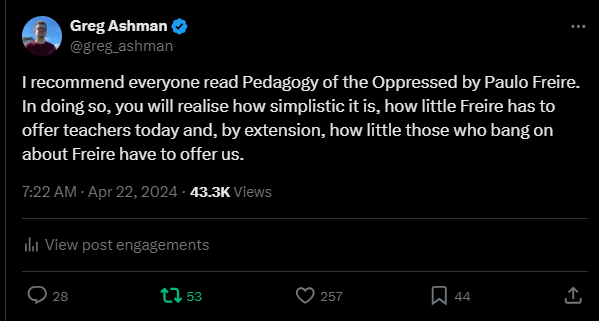This week began with my birthday. We went to Melbourne for the evening and I was treated to a steak in a properly fancy restaurant. We even went for a bit of a boogie afterwards and so it was like celebrating my birthday by pretending I am not as old as I am.
It was Anzac Day here in Australia on Thursday. This is a solemn public holiday at which we commemorate the sacrifice of the Australian and New Zealand Army Corps in the first world war as well as those who have fought since. This has prompted a group of Australian teachers to focus on the role of the Anzacs in Palestine — a legitimate line of inquiry but not one for a day when we are reflecting on sacrifice.
This week’s Curios include Paulo Freire, a ‘fact check’ of the science of reading, cute little bunnies and much more.
Brazilian revolutionary philosopher of the week
In recent times, it has become a bit of a meme on Twitter to enquire, “Have you ever engaged with the work of Paulo Freire?” I will leave it to you to uncover the source, should you wish, but it does raise the question of who Freire is and what he has to do with anything.
Me? I certainly have engaged with his work. Early in my blogging career, I read Freire’s key text, Pedagogy of the Oppressed and wrote a review. In short, I found it simplistic and abstract. To Freire, the world is a cosmic battle between the ‘oppressors’ and the ‘oppressed,’ yet little detail is given as to the practical manifestations of this. Freire approvingly quotes the late Chinese leader, Chairman Mao, and implies his agreement with aspects of Mao’s homicidal and deranged Cultural Revolution.
What does Pedagogy of the Oppressed have to do with education? Well, at one point, Freire attacks traditional forms of education as a ‘banking’ model. Showing no room for nuance, he lists features of this model that are, at best, questionable. For example:
“The teacher presents himself to his students as their necessary opposite; by considering their ignorance absolute, he justifies his own existence.”
Why it is necessary to consider the ignorance of students to be absolute is never explained. In fact, teaching from such a standpoint would be challenging. What analogies could we draw on? What prior learning could we build on? Nevertheless, in its full throated rejection of teacher exposition, it is easy to see why it appeals to ideologically committed but critically challenged educational progressivists.
And yet its appeal may not travel much further. I posted a tweet critical of Freire and Pedagogy of the Oppressed which gained large amounts of traction:
I also took a few minutes to write a joke post about those who promote Freire and the ‘critical pedagogy’ movement he spawned — which I know is not to everyone’s taste.
Inevitability of the week
I have been documenting the story around the anonymous complaint sent to Stanford University alleging that Jo Boaler, a maths education professor, misrepresented citations. Somewhat inevitably, Stanford have declined to investigate. According to Greta Reich in The Stanford Daily, the Stanford spokesperson Dee Mostofi stated:
“In this case, the University has reviewed the matter and has concluded that no formal process is needed, and that the allegations reflect scholarly disagreement and interpretation.”
As others have pointed out, given some of the citations and what Boaler claimed about them, the fact that the allegations reflect ‘scholarly disagreement’ says more about the field of maths education research than anything else. It is a theme that Jon Star touches on in an article by Jill Barshay for The Hechinger Report:
“‘People have raised questions for a long time about the rigor and the care in which Jo makes claims related to both her own research and others,’ said Jon Star, a professor of math education at Harvard Graduate School of Education.
But Star says many other education researchers have done exactly the same, and the ‘liberties’ Boaler takes are common in the field. ‘That’s not to suggest that taking these liberties is okay,’ Star said, ‘but she is being called out for it.’”
I guess this is why we can’t have nice things.
Regardless, the inimitable Dr Keith Devlin, emeritus mathematician, knows exactly what’s going on:
Personally, I seem to have misplaced my MAGA baseball cap. And I don’t actually recall claiming the result of the 2020 U.S. election was stolen. So, he cannot possibly be referring to me. Therefore, I will assume that it is fine by Devlin for me to continue my criticisms of Boaler’s research — see below.
Unfalsifiable theory of the week
Some people become quite agitated about cognitive load theory and the suggestion that it is founded in evolutionary educational psychology. There is a distaste for evolutionary psychology more generally, with the common complaint being that it is unfalsifiable — essentially, there are no ways to test claims about what happened way back in human evolution.
Keep reading with a 7-day free trial
Subscribe to Filling The Pail to keep reading this post and get 7 days of free access to the full post archives.







